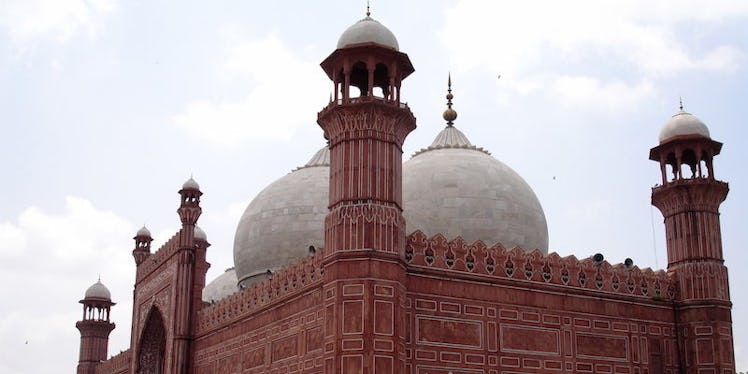
Only Love: How I Abandoned My Fear And Traveled To The Pakistan Border
In March, I traveled to the border of Pakistan with a great deal of trepidation.
A two-week trek through India with my husband and 12 colleagues included a visit to the Wagah border.
This area is known for its sunset ceremony. On the border, the two countries tried to be each be more patriotic than the other, as they lower their flags for the day.
It is charged with political and historical tension, yet it is somehow amicable and therapeutic.
Just months earlier in the same location, a suicide bomber had killed 60 and injured more than 100 people.
There is no denying that we were living in a tumultuous international landscape, and it was a dangerous time to be traveling as an American tourist anywhere in the world.
My fear was palpable, but I knew that I could not let it prevent me from experiencing one of the most vibrant and rich traditions in a part of the world that was truly foreign to me.
A desire to be exposed to -- and to appreciate -- other cultures outweighed my safety concerns.
With a group of like-minded people, I set out to learn something, and to better understand my fellow brothers and sisters, even if we didn’t speak the same language or pray to the same god.
But as soon as the trip began, fear found its way back inside my heart.
The security checkpoints began on Grand Trunk Road, the long highway that stretches from India all the way into Pakistan and Afghanistan.
A heavily armed security officer boarded our bus, reviewed our passports and directed us to the next series of checkpoints.
A normally boisterous group of teachers became quiet and subdued.
We eventually had to leave the comfort of our bus. Men were separated from women, and tour guides were not allowed to accompany us.
Alone, we set out for a 20-minute walk to the border’s entrance.
The women lined up to enter small structures flanked by curtains; they weren’t unlike the metal detectors we see at airports.
We were thoroughly patted down a number of times before being allowed to find a seat in the stadium. While I knew it was necessary, somehow these extra security measures intensified my fear.
My colleagues all seemed to share the same dubious expression, while the process seemed routine and even exciting for those around us.
An Indian woman in a vibrant sari noticed my pallid complexion and smiled warmly at me. Without saying anything verbally, she assured me everything was going to be ok.
We walked, side-by-side, for what seemed like an exorbitant amount of time. She pointed out children who were having their faces painted.
She nodded to the flags that were waving, the golden hues of the sunset and the popcorn that was being sold in clear plastic bags on the side of the road.
Mostly, she pointed out the smiles on everyone’s faces as she, herself, wore a smile that was even more vibrant than our surroundings. This was a happy event, she told me, a celebration.
I was so thankful for this woman, a complete stranger, who showed me all of the things I would have missed if I had become prisoner of my fear.
Without her, I would have been looking nervously through the dense crowd to find my husband.
I would have been hyper-vigilant. I would have analyzed everyone around me.
I would have made unfair assumptions about people I did not know.
I would have missed the tangible love Indians have for their country. And, I would have missed an opportunity to experience the true beauty of connecting with another human being.
Last week’s terror attacks in Paris have resulted in an onslaught of criticism, debate and fear.
For many westerners, it has been yet another reminder that one does need not need to travel to an exotic border to feel unnerved about terrorism.
Concern is mounting in our very own backyard.
And so, questions inevitably arise:
Should we let Syrian refugees into our states? Should we treat them the way we treated the Japanese during WWII? Do we need to look closer at all Muslims in our country?
What I learned from my visit to the Wagah border is how easily it is to become completely paralyzed by fear.
While some may view it as an essential tool in the fight against terror, I believe it’s more like a bubble that prevents us from ever really seeing anything clearly.
We must ask ourselves if it’s worth it to let fear win, especially if it means losing sight of the beauty that exists in the world.